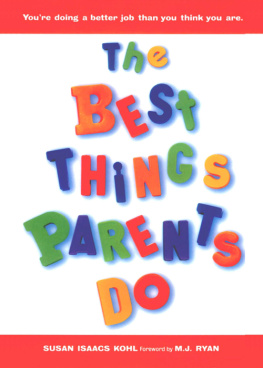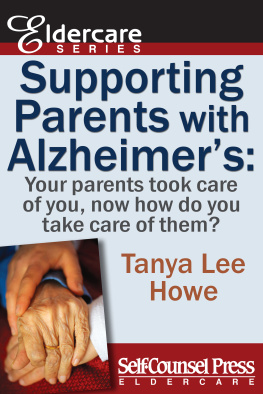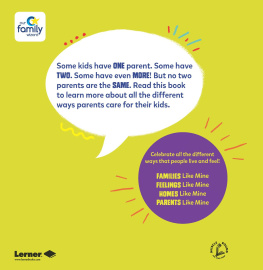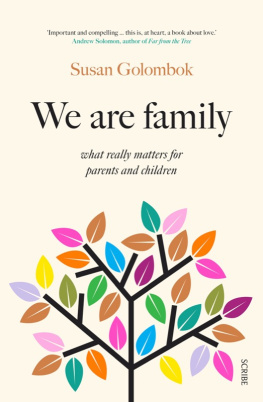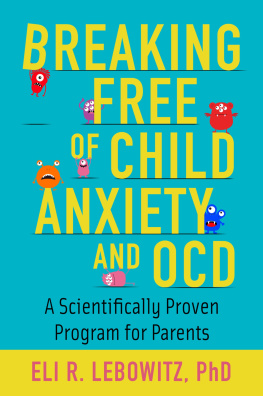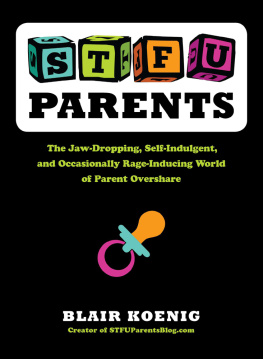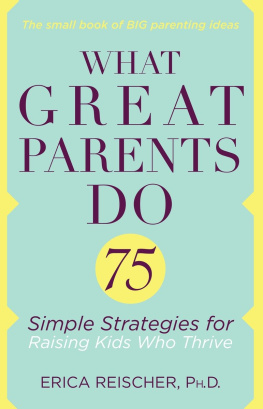PRAISE FOR
The Best Things Parents Do
Drawing on her own rich personal and professional experiences, Kohl describes the typical predicaments today's parents face and offers practical strategies for coping with them.
Lilian G. Katz, Ph.D., Professor Emerita of Early Childhood Education,
Co-Director of ERIC Clearinghouse on Elementary
& Early Childhood Education at the University of Illinois
At a time when everyone, layperson and professional alike, seems to have endless advice for parents and be more than willing to point out shortcomings, The Best Things Parents Do speaks with a decidedly different and refreshing voice. This holds up a mirror that reflects love, compassion, and courage. Kohl writes, What a privilege it is to be the person in a child's life who looks past his weaknesses to see the gifts that will become the gateways for new development. This, in fact, is exactly what she does for parents in this book.
The Best Things Parents Do is a must read for every parent who has ever felt incompetent, discouraged, or overwhelmedin other words, a 'must read' for every parent!
Wendy L. Ritchey, Ph.D., licensed psychologist, private practice
I am impressed with Susan Kohl's ability to put herself in the parent's place with sensitivity and compassion. The ways in which Kohl introduces knowledge and insights from many sources reveals creativity and a rich knowledge in psychology, developmental theory, humor, and problems associated with everyday living. As her former teacher, I cherished her. I am deeply touched to have the opportunity to honor her.
Mary B. Lane, Ed.D., Professor Emeritus, San Francisco State University
and author of Our Schools: Frontline for the 21st Century,
Education for Parenting, and Understanding Human Development

To Carol,
whose love has awakened my appreciation
for the best things parents do
First published in 2004 by Conari Press,
an imprint of Red Wheel/Weiser, LLC
York Beach, ME
With offices at:
368 Congress St.
Boston, MA 02210
www.redwheelweiser.com
Copyright 2004 Susan Isaacs Kohl
All rights reserved. No part of this publication may be reproduced or transmitted in any form or by any means, electronic or mechanical, including photocopying, recording, or by any information storage and retrieval system, without permission in writing from Red Wheel/Weiser, LLC. Reviewers may quote brief passages.
Library of Congress Cataloging-in-Publication Data
Kohl, Susan Isaacs.
The best things parents do : ideas & insights from real-world parents / Susan Isaacs Kohl.
p. cm.
Includes bibliographical references.
ISBN 1-57324-902-5
1. Parenting. 2. Parent and child. I. Title.
HQ755.8.K64 2004
649.1dc22
2003021937
Typeset in ITC Century Book, Bureau Grotesque, and Clarendon
Printed in Canada
TCP
11 10 09 08 07 06 05 04
8 7 6 5 4 3 2
www.redwheelweiser.com
www.redwheelweiser.com/newsletter
TABLE OF CONTENTS
FOREWORD
T he first time I met Susie Kohl was over the phone. I had applied for my daughter Ana Li to attend the Meher Schools, a place around the corner from where we live that teaches grades preschool through five. At the time, Ana was two and a half, had very little language, and was not yet toilet trained. She had been abandoned at birth in China and was severely neglected. When we got her at age thirteen months, she weighed only thirteen pounds and could not roll over from front to back. Since the moment the orphanage workers put her into my arms, she had not been separated from me or my husband, Don.
Susie called because she was the head of the preschool. Having read Ana's application, her soft voice said, I think it would be best if I come and meet her at your house. So she arrived on my doorstep and proceeded to crouch down to talk to Ana. They played together for a while, and Susie returned the next day for more of the same. Then she suggested that we bring Ana to see the classroom she would be in when no one but Susie was there. We did that for a few evenings so Ana could get accustomed to the room and toys. Finally the big day arrivedAna goes to preschooland the only person who had tears in his eyes and separation anxiety was Daddy, who cried all the way home.
Ana stayed in that room with Miss Susie, as she calls her, for three years. Today, she is in first gradea bright, confident, talented child with no signs of her early trauma. Since that first phone call, Susie has been my trusted confidante and parenting advisor. I know that my child is happy and secure and that I am a better parent due in great part to Susie's counsel and care.
Early on in our relationship, I asked what I could do to make the transition from home to school a smooth one. She said, The best thing you can do is spend twenty minutes with Ana in the morning with no agenda. The rest of the day will go more smoothly. And lo and behold, she was right. Not only was getting Ana out the door pretty painless, but I counted those twenty minutes a day our most precious times. We'd lie in bed together, looking out the skylight and talking about whatever drifted into Ana's mind. After that, every time I was stuck or confused, I would seek Susie out. Each time, I found her suggestions wise and effective.
Now that you know my story, you will understand why I can't recommend The Best Things Parents Do highly enough. I am so glad this book has been published. Now everyone can have the benefit of Susie's wisdom and experience. Susie Kohl has been a mother, a teacher, a teacher of teachers, a preschool administrator, and a writer of parenting articles and books for many years. She knows what she is talking about.
And what she is talking about is so important! How to support the becoming of this tiny, vulnerable being that has been entrusted to our care. How to support ourselves as we go through this miraculous and challenging process while doing all the other things we must in our lives. And how to navigate the complexity of it all without beating ourselves up with guilt or regret.
Susie, like me, comes from what psychologists call an asset-focused approach. What that means is that she knows it is better to focus on what is right and goodin ourselves and our childrenand strengthen that, rather than look at our flaws, weaknesses, or failures, which is a deficit focus. That's the beauty of this book. It helps us realize what we do well now so we can do more of it, rather than getting bogged down in all that we should or ought to do.
Recently I read two things that emphasized the difference between an asset and a deficit approach. The first one was an article that said parents today are more anxious about doing it right than any other time in history. The second was the opening line of Dr. Benjamin Spock's famous baby-care book: Trust yourself, you know more than you think.
So consider The Best Things Parents Do an antidote to parental anxiety, a hand to hold so that you can trust yourself as a parent more and more. The greater health and happiness of your kids will be their own reward. And that, in turn, will be a gift to the world at large.
M.J. RYAN, AUTHOR OF THE POWER OF PATIENCE AND ATTITUDES OF GRATITUDE
ACKNOWLEDGMENTS
M y work on The Best Things Parents Do inspired plentiful discussion and collaboration within my family. I am indebted to my son Matt, my daughters Gabrielle and Mari, my mother Mary, and my daughter-in-law Lana for letting me tell tales about them. In addition, my heartfelt thanks to Matt, Gabrielle, Mari, my son-in-law Peter, and family friend Sharon Hatami for contributing precious hours of their time to proofreading and offering important feedback. My husband, Jeff, whom I consider the best step-dad and grandfather I know, helped in so many ways that no thanks would ever be enough. I see my beloved family's support as a reflection of the joy and privilege I experience every day just having them in my life.

